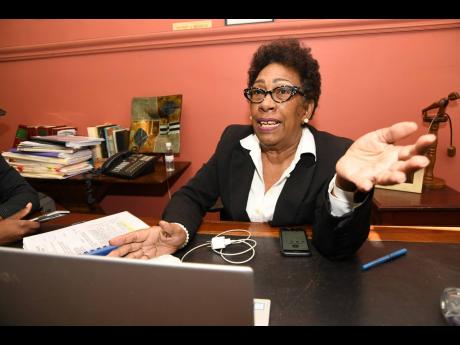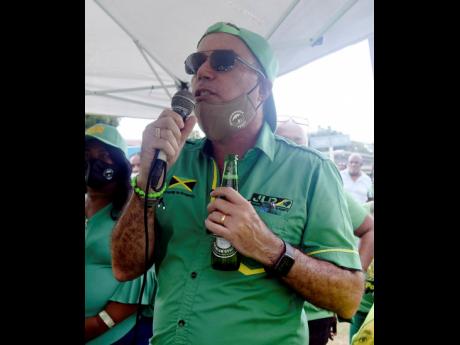BUY ELECTION? Neita-Robertson building case to seek redress in court over vote-buying allegations
Video footage said to have been captured in Portland Western is proof of the widescale and brazen vote-buying across the constituency during the recent general election, the losing candidate has charged.
The 96-second clip, which shows a man signing a sheet of paper before collecting cash from someone seated in the back of car, is among the “evidence” Valerie Neita-Robertson, QC, is collecting as she ponders her legal options.
“The best place to go is to the courts ... to seek some redress to this vote-buying and voter fraud,” said Neita-Robertson, a prominent attorney. “The courts protect our democracy and our Constitution because various bodies that are there to protect us are just not protecting us.”
Influencing an elector to vote for a particular candidate is illegal under Jamaica’s electoral laws, the Representation of the People Act, and is punishable by a minimum fine of $10,000, 12 months in prison or both.
Neita-Robertson, the People’s National Party (PNP) candidate for Portland Western, failed in her attempt to wrest the constituency from Jamaica Labour Party (JLP) incumbent Daryl Vaz on September 3.
She told The Sunday Gleaner that the video footage was recorded just before 1 p.m. on election day, close to a polling station in the community of Shrewsbury, located in the St Margaret’s Bay division.
While acknowledging that allegations of vote-buying appear to have increased for the 2020 parliamentary elections, Political Ombudsman Donna Parchment Brown cautioned that the video footage was inconclusive.
She, however, indicated that it could be useful to her office.
“It has no content on it except for one licence plate that could potentially be helpful in the future. I would form no conclusion just looking at that snippet of video,” she told The Sunday Gleaner last Thursday after viewing the clip.
“If that was submitted to me as a report or as a complaint, I would want some information on the where, when, what and who were involved. If I’m not able to get that information from the person complaining, then I would use whatever information, particularly the when and where, to have an investigation conducted by the police and see where it takes us.”
Vaz declined to comment for this story, saying, “I was not there”.
However, JLP sources disclosed that there are “hundreds” of Portland Western electors who reside outside the constituency.
They suggested that the video could have captured persons being reimbursed for transportation and other expenses incurred to cast their ballots.
“It was in the open so it must have been that,” said one source.
But Neita-Robertson stood by her claims, insisting that the persons engaged in vote-buying targeted apathetic PNP and JLP supporters with cash payments of $2,000, $5,000 and $10,000.
“People are a lot hesitant to come forward. A lot of them are young people and they were told that they can be prosecuted,” she said. “So, what I am trying to do is to get two or three of them to give me a statement and I get some form of protection for them because they would fall under the category of whistle-blowers.”
Neita-Robertson indicated that she would consider forwarding a copy of the video to the political ombudsman, but questioned the effectiveness of that office.
“This complaint [of vote-buying] was made in the Damion Crawford by-election,” she said, referencing the Portland Eastern by-election won by Ann-Marie Vaz last year. “I made a complaint in the 2016 election in West St Mary, … but nothing was done about it, and it is now more widespread.”
Added Neita-Robertson: “I don’t need somebody to complain to or somebody’s shoulder to cry on. I am not crying, I am outraged at what has become of our country.”
Following the Portland Eastern by-election, Parchment Brown had announced that her office was probing credible allegations of vote-buying. She also told this newspaper at the time that the police would be investigating the claims as her office seeks to make an example of possible lawbreakers.
Last Thursday, she acknowledged that there were “several allegations of vote-buying” in that by-election, but could not recall “that I indicated that I was investigating all”.
She said that in one case, her office was not able to get the additional information required to elevate it to a “proper investigation”.
“In relation to another matter, with the assistance of another arm of the State, the investigation was carried out. We were unable to make out that the allegation was substantiated, in part, because of what was said to be fear of being identified,” she said, declining to give details because the case was not made public.
For years, Jamaica’s two main political parties have traded accusations of vote-buying during national elections.
Paul Burke, who served as PNP general secretary when the party was booted from power in the 2016 general election, revealed that the leadership of the political organisation at the time came under “heavy criticisms” from members for not agreeing to a national vote-buying strategy.
He said that he, along with former PNP President Portia Simpson Miller and campaign director Dr Peter Phillips, faced the heat.
Burke disclosed that the first time he saw vote-buying employed in the PNP was in 1995, but did not disclose the circumstances.
“It was on a small scale, and by 1996, it had gone to a large scale,” he told The Sunday Gleaner.
Seeking to clarify his comments, Burke insisted that it was not a central election strategy sanctioned by the leadership of the PNP.
“The PNP, its campaign organising committee, does not allocate money for the buying of votes. It did not happen in 2011, it did not happen in 2016 under my watch, and it did not happen in 2020,” he insisted.
He did not disclose names, but suggested that persons in leadership positions were, however, involved in the practice.
“Some of our leaders, either by commission or omission, have either openly participated or deliberately turned a blind eye. These statements don’t make me popular within my own party, but it is the truth, the whole truth and nothing but the truth,” the former PNP general secretary said.
Taking a shot at the JLP, Burke said this should not bar the PNP from complaining about what he described as the “wholesale, pandemic-level voter-buying” in the country, although he admitted that he did not have evidence of money changing hands.
“The JLP, I am convinced, has a central organising strategy, based on what I have seen over the years, of motivating its base and other persons through cash to vote,” Burke charged.


